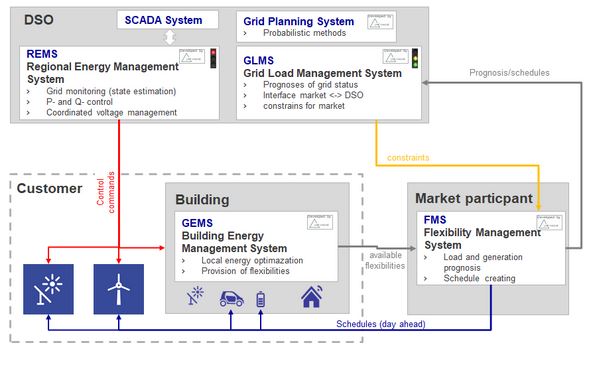Grid-control - Netze BW GmbH
With a consortium of nine project partners, Netze BW GmbH as the consortium leader develops a comprehensive system approach for the successful realization of the German “Energiewende”...

With a consortium of nine project partners, Netze BW GmbH as the consortium leader develops a comprehensive system approach for the successful realization of the German “Energiewende”. The aim is to develop and evaluate new concepts and innovative system solutions, in order to achieve an overall concept for sustainable distribution grids. The concepts and the implemented system solutions are being tested and evaluated in laboratory tests and field tests.
Use cases
The overall developed integrated system has the following use cases:
- Power flow control at reference nodes: Aggregated power-flow control on a reference node of the distribution grid (e.g. substation) being implemented in a decentralised automation system.
- Coordinated Voltage Management: Prioritisation and coordination of different voltage regulatory actions in order to conduct an optimised voltage management.
- Short-Circuit Power and Spinning Reserve: Investigation of decentralised generation units in distribution grids facilitating the provision of spinning reserve and short-circuit power.
- State Estimation: Reliable and precise determination of the grid state with minimum sensor systems.
- Probabilistic Grid Planning: Enhancement of efficiency of the grid resources by avoiding inefficient grid expansion and using available flexibility.
- Load Flow Prognosis/ Congestion Forecasting: Integrated process between market side and the DSO for load flow forecasts.
- Congestion Management based on the German Traffic Light Concept: Approach for the cooperation between DSO, market participants and the prosumer. Flexibility request by providing non-discriminatory limits by means of quota (yellow phase) or opportunity ranges (green phase) to the market participants. Further development of the approach of Project “Flexible-Power-to-Heat”.

Key results/findings
First results of the laboratory and field tests include the:
- Successful demonstration of power flow control at reference nodes using two different methods; control by a set value and control to a set point.
- Investigation of probabilistic grid planning using the data obtained in the field test.
- Investigation of the dynamic stability and the behaviour of the BESS under different feed-in situations in the case of a microgrid in the LV grid in Allmend.
- Implementation of an integrated process between prosumers, market participants and the DSO for load flow forecasts which can acceptably forecast the power load flow day ahead.
- Implementation of congestion management via the allocation of non-discriminatory quotas to the market participants for periods of time where congestion is predicted.
Some of the greatest challenges in the field test have been the availability of communication and the suitability and responsiveness of the controllable assets installed in each grid section. The field tests are still running until the end of December 2018. The final evaluation of the results follows closely after.

Link to the webpage(s):
http://projekt-grid-control.de/english/
https://www.netze-bw.de/unsernetz/innovationen/grid-control